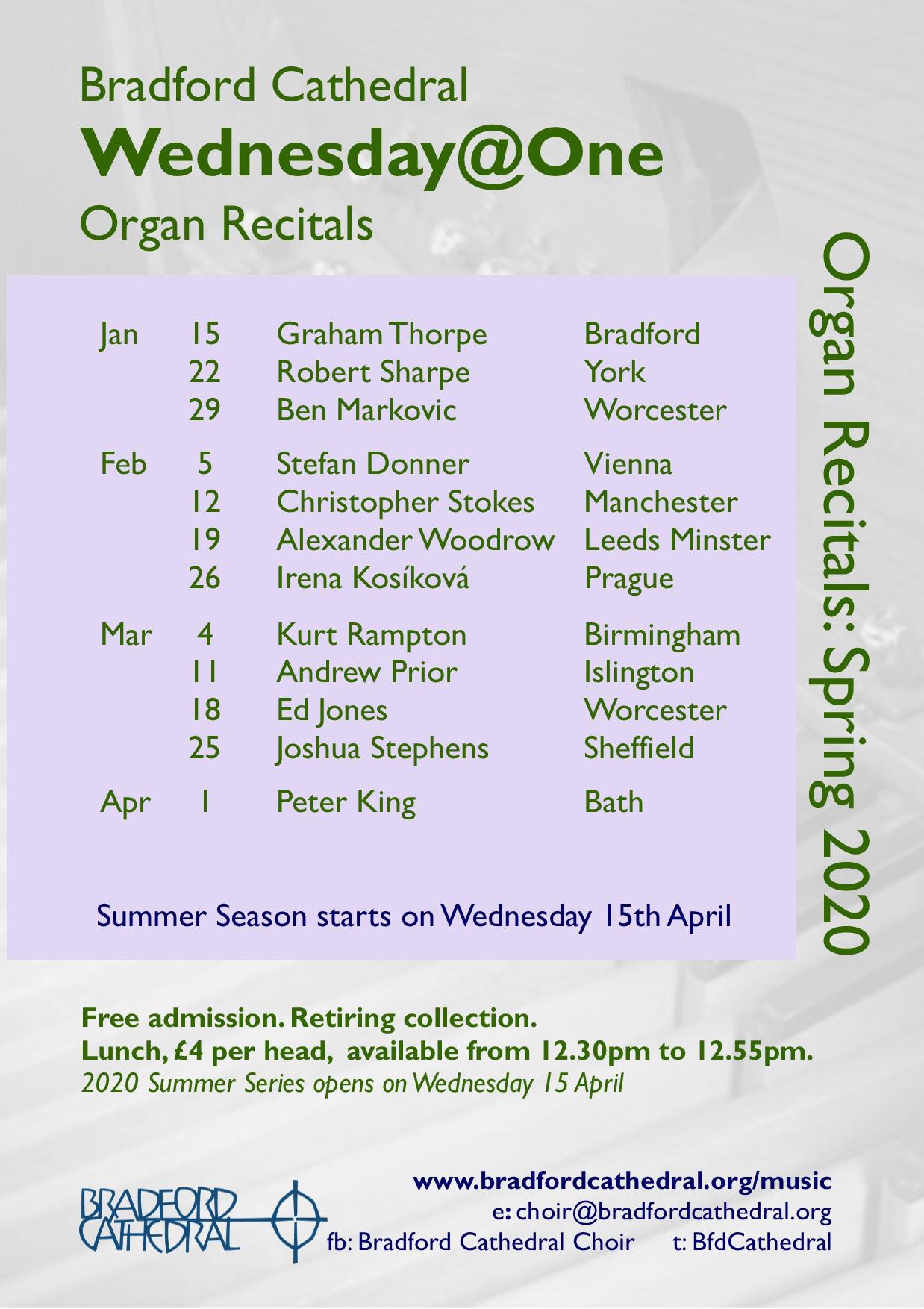
23 minute read
Organ Recitals
Let’s find out more about our upcoming recitalists at this month’s organ recitals. Please visit our website at bradfordcathedral.org/music/ organ-recitals where you can read past interviews with all of this year’s organ recitalists, and listen back to recitals from Graham Thorpe, Ben Markovic, Stefan Donner and Alexander Woodrow, as well as other sessions from 2019.
More content is added all the time so keep checking back!
Advertisement
Andrew Prior
Could you give us an introduction to how you got into music? I was a chorister in the local village choir when I was a boy and started learning the piano at around the age of five at school. Whilst singing in the choir I was rather captivated by the organ. My piano teacher was an organist in a neighbouring village. I wasn’t very good at practicing diligently, so he said that if I could get a piece I was learning ready by the following week, he’d let me play it on the church organ. That was when I was aged about eight and it just stuck, as I really enjoyed the experience. I soon was able to play hymns at church services and then voluntaries, and it went from there.
My parents, very kindly, bought me an organ for the house. We had a small sun lounge at the back and they bought a three manual and pedal reed organ, which is quite unusual, but it fitted into the space and it became my practice instrument.
At fourteen, I became the organist at my local church, which was great fun, and at the same age I was asked to play for my sister’s wedding at St. Bride’s, Fleet Street, which is one of the big churches in London. I was terrified at the prospect, but I played for her wedding and conducting that service was the Director of Music at HM Chapels Royal at Hampton Court. Afterwards he wrote to my father and said that he had been very taken by my playing and invited me to be the first organ scholar at HM Chapels Royal! I started that at the age of fifteen-and-a-half.
You were a solicitor by profession; did you find music was a good balance with that? It was an excellent balance. We sold the reed organ we had to a solicitor /organist with whom we became good friends. My parents had come across a wonderful organ builder called George Sixsmith, whose organ company in Ashton-under-Lyne is still going. They built a very small tworank extension pipe organ for our sun lounge. There were two ranks of pipes contained in a swell box with a glass front, and attached was a two manual and pedal organ. Our solicitor friend told me that if I ever wanted to go into the profession to let him know. My organ scholarship at Hampton Court helped my CV greatly in applying for an organ scholarship to
When I went up to Cambridge I soon realised that I was up against people like John Scott, Thomas Trotter and David Hill, all wonderfully talented people, and I thought to myself that I couldn’t compete with them as they were so much better than me, so I took that solicitor up on his offer.
As an aside, in 1977, in my first term I went to stay with my senior organ scholar in Bingley and he took me to Bradford Cathedral as John Scott was playing the opening recital on the newly restored organ by Walker. So it’s wonderful to be coming back.
I took up the legal profession with the aim of playing the organ, keeping music as an informal hobby. I kept it going, but drifted a bit for ten years until I found myself deputising for a church in Surrey which had the most amazing organ made by Frobenius, a Danish organ builder, and I had a new lease of life there, being the organist for eleven years.
I had the most wonderful time doing that until I was around the age of forty, by which time my job moved me from being local to London, so I didn’t have time to practice and so I let it slip again.
I carried on playing for for friends and families at funerals and weddings but when I reached sixty, almost two years ago, there was a restructuring at work and I was made an offer for early retirement, and the figures worked out. My wife, at the time, was working at All Saints, Margaret Street, where Dame Gillian Weir, the wonderful organist who taught me at Cambridge, was in the office. She asked what I planned to do with my retirement and she told me to get back onto the organ bench and get playing!

At this same time a professional organist friend had just bought a Hauptwerk organ, and given his enthusiasm for the way technology had moved on, I was inspired to purchase a system for our home which was installed in the attic of our house in North London. Alex Berry, your director of music then paid us a visit through a mutual friend, and we played on the instrument and chatted about my return to playing, which led to him to set me a target to give a recital in Bradford in a year’s time, and so here we are!
With your music, travelling and photography you’re enjoying your retirement? I’m loving it! It’s so fulfilling as my day will start with some organ practice and then I take photographs for people who need profile shots for their website, and I have just worked on photographs for the front cover of Organists Review. Those two hobbies are keeping me more than busy, not to mention travelling as well. Life couldn’t be better!
For you, what makes a good lunchtime organ recital? I think the objective is to ensure that everyone who goes home after recital has liked something. They might have been informed by a piece or a composer they don’t know; they may have been wowed by something that was exciting; or they may just carry a tune away with them. One of the pieces I’m playing is Elegy by George Thalben-Ball, who was remarkably famous in his day, and was organist at Temple Church in London. I went to the City of London School and all the choristers would come from the school and I got to know Thalben-Ball very well indeed. He was a wonderful and inspirational man. He advised that when you give a recital, you should make sure that you have given pleasure to those who’ve come along to hear you. You may have a musician there, an academic, or a shopkeeper, or someone who has just popped in for forty minutes in their lunch break. You can’t be too esoteric or too academic; you have to give a good variety. How did you pick your pieces for your recital? J.S. Bach is always going to be key in my view. Of all the composers who wrote for the organ, Bach is really supreme, and so it’s always a good thing to include some of his music. And his great mentor was Buxtehude, so that gave me the shape for the start of the recital. In between these composers, I have some chorale preludes from composers from Norway, England and France, all written for the Orgelbuchlein Project of which I’m a trustee and patron. That project came about because Bach’s Orgelbüchlein, or ‘Little Organ Book’ was intended to contain around 164 choral preludes based on the hymn tunes of the day, but Bach only completed 46, leaving blank pages, some with just the title, or the title and the tune.
My very good friend William Whitehead started the project to complete the book but with composers from the modern day, composing short chorale preludes to fill the gaps. This project was completed last year and to celebrate the achievement I decded that whenever I give an organ recital I should play some of the pieces, to get them out there to make people aware of this great work that my friend did over these years in encouraging composers to come forward and compose!
Then we finish with France. ThalbenBall often played Fiat Lux by Theodore Dubois, and so I thought I’d end with that, and precede it with a beautiful and quiet piece from the same volume of twelve pieces, In Paradisum.
I therefore hope that there’s something for everyone in my organ recital!
I imagine that variety keeps things interesting for you as the player? It does, because each piece has its own challenges. The three pieces from the Orgelbuchlein Project are so different: one is very slow, one is very delicate, and one is quite bonkers! They’re three representative pieces from the project and they give me a challenge in registering them to bring out their character, which of course applies to all the pieces I’ll be playing. I’m looking forward very much to acquainting myself with the instrument so as to produce the colours to show them all off well.
Finally, do you have any big plans for the rest of 2020?
More recitals! I’m grateful to Alex Berry for inviting me to give this recital, as I’d not really intended to give organ recitals on an on-going basis. I’ve really loved this challenge as its renewed my enthusiasm for communicating music to wider audiences, so on the strength on this I have another recital to give in South London in October and before then a recital in a Stately Home in Wiltshire.
Ed Jones
So what have you been up to since you left Bradford Cathedral? I’ve started a new post at Worcester. I’m the sub-assistant organist and my main duties are that I direct the voluntary choir of boys and adults, and the principal accompanist of the Cathedral Choir when the girls are singing. But because it’s just a parttime job I can also fill my time up with other bits and pieces, which keeps it fun! knew the Director of Music from a previous post so I get on really well with him and it’s a joy to work with everyone else.
Your biography says that you’re acting as the Chief Worcester Sauce taster. Have you received many accolades for that? Well that’s necessarily true…! I usually put some amusing things in my biogs. I have no formal post with them unfortunately!
How are things at Worcester Cathedral? They’re going very well - all the music is really fun to be involved with. I Could you give us a brief introduction to yourself? I came into cathedral music because I heard a counter-tenor sing. If you see
a cat on the street and it barks, it’s not what you expect. It was the same for me hearing a counter-tenor for the first time! I then started singing alongside him at the cathedral. It was then a Priest who phoned me up and asked if I wanted to play the organ at a local parish church, during my time at University.
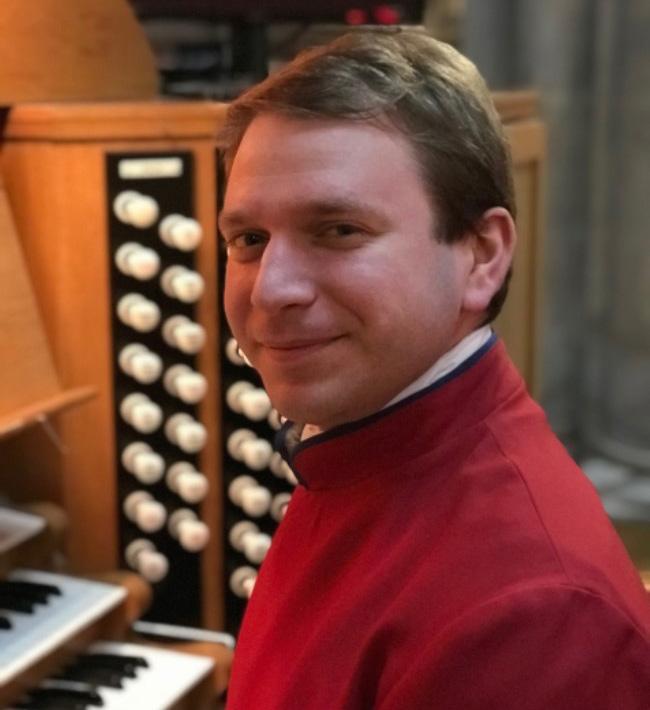
For you, what makes a great lunchtime organ recital? It’s tricky. I try and have something interesting for a lot of people, so I’ll have something spiky, something that has a nice flowing melody, and something that people will latch onto or might well know. Also something interested that the organ enthusiasts will have to talk about, but something that people who don’t know anything about organ music will still enjoy for forty-five minutes.
How did you pick the pieces for your recital? I picked Jackson’s Diversion for Mixtures because the mixtures sound absolutely fabulous on the organ here, so I thought I’d learn it for that very purpose. The choir were singing some Jackson that day so it fitted well.
MacMillan’s St Andrew’s Suite is a piece I bought years and years ago for the middle movement as it’s very slow and very beautiful, and I later thought I should learn the rest of it to keep hold of my Scottish heritage. I was actually in St. Andrews when it was premiered. Hindemith’s Sonata no. 2 is a strange one. Hindemith wrote a sonata for every single instrument as he thought it would be a good compositional tool. He’s a very intelligent man, writing for all these instruments, so it’s quite a challenge playing it. He enjoyed the organ so much he wrote a further two sonatas for the instrument! I played the first one quite a bit so now I’m learning the second one.
Alain’s Litanies is a piece that I heard and thought, ‘I must learn that’, then I didn’t learn it as it’s quite tricky – then a year later I’d hear it again and so on – and this happened to me about five times and I realized I had to learn it, so I bought the music and put it down on the music list and, of course, once it’s printed you have to play it!
It’s a phenomenal piece, but he was a French organist who died in the war at only 29-years-old. His music is so wonderful and I often wonder, had he lived on, what he would have gone onto write.
What are your plans for the rest of 2020? There are lots of projects going on in Worcester. The current challenge I have this week is to complete a 4x4 Rubik’s cube! I’ll just see what the rest of the year brings.
Finally, going back to your entirely serious biography: your hobbies are distance running, Guyanese wood-carving, and curry and beer – but which is the best? The one I look forward to most on my Bradford trips is the curry! Worcester has a really good selection of Thai curries but not much in the way of Indian curries. Wherever you go there is good beer; wherever you go you can go for long runs, and wherever you go you can carve, but the curry is something I definitely miss from Bradford!
Joshua Stephens
So how did you get into the organ? I was a chorister at Sheffield Cathedral. I joined the choir when I was eight and was recruited by the then Director of Music Neil Taylor, who is a previous Bradford Cathedral choir member. He came to my school and got me to sing ‘Happy Birthday’ and that was the beginning of five happy years in the cathedral choir. That absolutely changed my life: we toured to America, Paris and sang at Notre Dame Cathedral, the Netherlands; all experiences which will stay with me for the rest of my life. It’s shaped and molded everything I currently do.
When my voice changed at thirteen, I became interested in the organ, but I didn’t start learning it until I was fifteen. I carried on singing in various school choirs and I’d always played violin, but piano and organ was new to me. When I was eighteen, I successfully auditioned for the Royal Northern College of Music where I studied with Darius Battiwalla and Thomas Trotter, which was a fantastic experience. During my second year of undergraduate studies was the first year I gave a recital at Bradford Cathedral.
During my studies, I performed a lot of solo and chamber music, which was fun and very different from church music. When I finished my degree, I came back to Sheffield as organ scholar at the cathedral after some freelancing in Manchester. Following that I was Second Assistant Organist at Wells Cathedral. It was an incredible and fantastic experience working there with then Director of Music, Matthew Owens. They had such an incredible programme of music, with an amazing repertoire every night which felt like the making of me. I then returned to Sheffield in 2018 as Assistant Director of Music, and I am now acting Director of Music.
How are you finding the role? It’s as demanding and rewarding as you’d expect; working with Choristers and parents, Lay Clerks and Choral
Scholars, and the wider Cathedral team and community, then developing a performance programme that’s both engaging for the Choir – ensuring quality performance, along with a sense of development for members, but also one that is catered the needs of the worshipping community. I also have busy performance schedule on top of that with local choirs and recitals up and down the UK. It’s busy, but very fun and rewarding! Everyday has new positive challenges. I’m excited and invigorated by the role. approach a broadcast as if it’s the most nerve-wracking thing, but I just had the time of my life! So whenever I play the piece it reminds me of that experience. It was a high pressure and scary experience but it was amazing.
I remember the BBC producer asking if I can play this and my colleague turning to me at the time and saying ‘can you?’. I nodded, and said I could play it and it was sealed, and off into the Radio Times! It was such a great experience.
For you, what makes a great lunchtime organ recital? The time of the day affects what you play. A lunchtime recital should have a little of everything to offer: you want something fun, something serious; you want a little bit of academic as well. It’s good to try and cater for everyone. However, when I attend recitals and concerts, I find I’m less interested in what people are playing but more interested in them as a person and their personality shining through that performance. Someone showing me who they are without saying anything is interesting: it’s all about the performer.
How did you pick the pieces for your recital? I have a formula for a recital: I choose a big piece, then a little piece, big piece, little piece, like a meaty sandwich. Bach’s Toccata, Adagio, und Fuge C-dur means a lot to me as a few years ago I played the entire thing live as a voluntary on BBC Radio 3 Choral Evensong. Some people may Scheidemann’s Alleluja Laudem dicite Deo nostro is a little bit naughty as I’m playing a piece with ‘alleluja’ in it during Lent, but it’s a really interesting piece. Scheidemann was really one of the best cover artists of his day. The piece itself is actually based on a motet for singers by Hans Leo Hassler, who was one of the most influential European composers of his generation. Scheidemann was an interesting character, as whilst the rest of the world went to Italy to study music, he went to the Netherlands to study the organ specifically with Sweelinck. What you get with Scheidemann is an eclectic style: he’s taken an Italian-based motet and applied it with a Dutch twist and a Germanic accent. The type of music happening in the Netherlands at the time was directly linked to and inspired by the works of William Byrd, which had been taken to Amsterdam by various English composers and musicians who were either living or tour around that part of Europe at the time. It’s an eclectic European mix!
taken a closer look at his music, and it’s fantastic. I think he’s an incredibly intelligent and playful composer.
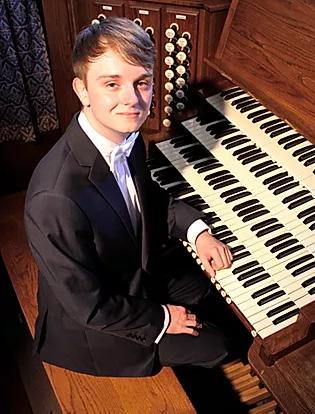
Francis Jackson’s Impromptu is a piece I’ve just played this lunchtime. It’s one of my favorite organ works to play: it’s beautiful and lyrical, then it goes into a fun sea-shanty, which is a little bit tongue-in-cheek really, and then it returns to its previous lyricism. It’s again a wonderful demonstration of personality. Francis Jackson wrote it for Sir Edward Bairstow for this 70th birthday. Francis Jackson was a chorister at York Minster, under Bairstow, and they had a very close relationship. Bairstow was almost a father-figure, in a mentor-type role. What you get through this music is this exchange of admiration for one another. Amazingly, Francis Jackson is still alive at 102 years old! During my time at Wells Cathedral, I premiered a piece by Jackson for choir and organ, which was wonderful. Since then I’ve Judith Bingham is one of the leading composers in Britain at the moment, and St Bride, assisted by angels is a fantasy-type piece which is based on a poem written by Bingham herself. The interesting thing about the poem as it’s only for the player; it’s not meant to be heard by the audience, and the player is supposed to convey the words, which are more-or-less there instead of the dynamics. It’s interesting to see the journey of St Bride flying through time all the way to the nativity. It’s also very playful. What I love about Bingham in particular, and I met her in 2017, is that she’s a very kind and approachable lady but with a dark and fun sense of humour. This really comes out in her music, sometimes unwittingly, and you get her personality coming through her music, which is what draws me to it. It’s all about the person behind the notes.
If we were just interested in the music itself, we could just type it into a computer and hear the notes. It really is about who is performing and what they can convey. If you go and hear a certain piece by Bach it’s going to be brilliant as his music has that quality about it, but what does the player offer? There’s always an essence of who they are and what they’re about, and that’s what interests me as a performer. And you often convey your
And finally Reger’s Improvisation from his Zweite Sonata. It’s a serious piece but it reminds me of an angsty teenager having a tantrum! It’s hyper emotional and the musical harmonies are so dense. The interesting thing about Reger as a composer is that his sense of harmony is too complex for the structure of the composition. But it’s a wonderful work, and full of romanticism – a fantastic dramatic piece.
Alongside many other achievements, you’ve also collaborated with Maxine Peake? I collaborated with her on a dramatic reading by Percy Shelley called The Masque of Anarchy. It’s a poem set around the Peterloo incident, so it’s very politically-charged. That was just one of the stand-out moments. It was very odd playing the organ for a theatrical show, and much of it was improvised. We only had to follow our cues. I remember in the first rehearsal, Maxine was so phenomenal that we missed our cues; we were so taken by her performance; drawn in so instantly. She’s one of the most incredible artists I’ve ever come across.
After that I saw her starring as Hamlet, and she proved herself to be one of the most compelling actors I’ve seen live. I’ve been quite lucky in this regard. I’ve done lots of interesting things, including singing on recordings and featured with the choir on two Channel 5 programmes at Christmas. It can all feel surreal at times.
What are your plans for the rest of 2020? I am going to be in my current role for at least the rest of the academic year until August time. In that time, like any Director of Music would, I want to build up the reputation and membership of the department and really solidify its future trajectory. I’m really excited about that, but I’m especially interested in looking at new and imaginative ways in how choral music can reach out and change the lives of people in our community. That’s an on-going journey which is exciting to be part of.
Since this interview, Joshua has been appointed as Master of the Music at Sheffield Cathedral.
38 Peter King
How did you get into music? I was a choir boy. As a small boy I was taking to church by my parents and I was fascinated by the organ. I went to a wonderful little private primary school run by a lady who ran a school in her own home and she gave piano lessons to selected pupils. She had the most beautiful grand piano in her front room, and she persuaded my parents that I should have piano lessons even though we didn’t have a piano at home at the time. I practised at school on another piano and at my next door neighbour’s. She was wonderful, as she knew that for a
small boy, one lesson a week was not enough, and that half-an-hour was too long, so I ended up with two twentyminute lessons a week, which was ideal.
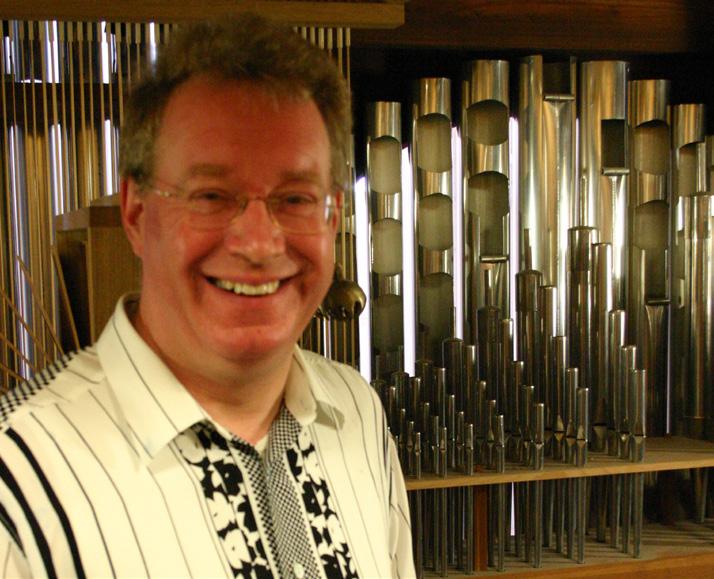
For you, what makes a good organ recital? I think a lot depends on the programming. Whatever your concert, you have to choose your programme carefully to suit the occasion and suit the audience. For instance, for a lunchtime recital, one might choose totally different music for that audience or a celebrity recital or an opening of a new instrument. In Bradford this recital falls in Lent, near Passiontide, so I’m opening with a magnificent piece by Liszt called Weinen, Klagen, Sorgen, Zagen, which means weeping, lamentation, angst, worry and despair. It’s very dramatic! It’s based on music that Liszt has borrowed from Bach, and a cantata of the same name. But Liszt’s variations go a great deal further than Bach’s. But at the end Liszt ends the same way as Bach, with the chorale “What God does is done well”, and the wonderful plain harmonies after the angst and storm that has gone before has such a That will be a dramatic start to the concert, and I then continue with a complete contrast with Saint-Saëns and his Fantasie ii in D flat. Liszt declared Saint-Saëns as the finest organist in the world and he used to sit beside Saint-Saëns’ console on a Sunday service. This piece is very lyrical, full of lovely colours, and inventive new textures. It’s very easy on the ear, and lyrical.
I finish with Toccata, Fugue & Hymne “Ave maris stella” by Peeters. A lot of people like a concert to end with a French toccata! You could hardly avoid his music in the middle of the last century; everybody was playing him in the 1950s-70s. But, after his death, he’s gone right out of fashion but his music is as good as it always was.
What are your plans for the rest of 2020? I’m playing in a number of places this year. A big thrill will be to play in the Abbey of St. Florian in Austria where Bruckner was the organist, and indeed he’s buried underneath the organ! It’s known as the Bruckner organ, and it’ll be a great privilege to play there and I’ll combine it with a few days holiday in Vienna. I’ve been there once, back in 1997, when I played with Sir Simon Rattle, and I was there accompanying the children’s choir in Britten’s War Requiem on the organ. I remember it because the organ in Bath was being re-built at the time and I brought a torte back for the builders; they were delighted!
For generations, people have come to Bradford Cathedral to worship and pray, to reflect, or just to sit and enjoy the beauty and peace of this special place. In 2019 we celebrated our centenary, and as we prepare for a new century, we’re launching an appeal to raise £150,000 to replace our old chairs. We want to better meet the needs of all those in our community who use this wonderful building now, and in the future. New chairs, that are both beautifully designed and practical, will help us to do this.
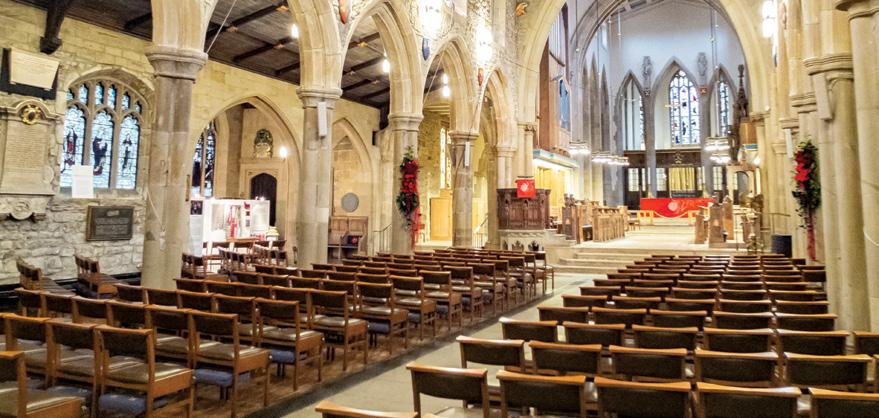
One Cathedra, many chairs! Every Cathedral has a ‘Cathedra’, which is Latin for ‘chair’. Here’s ours. With your help, we want to renew all public seating in the Cathedral to better serve our community.
Please donate to our Take a Seat appeal and help us raise £150,000. For more details visit www.bradfordcathedral.org/appeal or pick up an appeal leaflet at the Cathedral.







